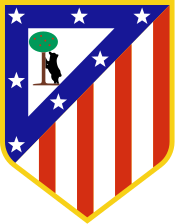SPANISH LA LIGA: ATLETICO MADRID FOOTBALL CLUB


The year also saw the emergence of Kun Agüero as a scoring threat, finishing third in the Pichichi Trophy standings with 19 goals. The season was not without controversy, though, as two of the team's Portuguese stars (Costinha and Maniche) left the team to go to Italy (a sale to Atalanta and a loan deal with Inter Milan, respectively) after highly-publicised disagreements with manager Javier Aguirre.
The 2007–08 season was one of Atletico's most successful campaigns in recent memory, with the team finishing strong both in La Liga and in Europe, progressing to the round of 32 in the UEFA Cup before being knocked out by English side Bolton Wanderers by a solitary goal at the Reebok. On the domestic side, los Rojiblancos achieved their highest league position in over 10 years: fourth overall, finishing level on the table with Sevilla with 64 points but beating them to the last Champions League qualifying place by virtue of their two wins against the Costa del Sol team (4–3 at the Calderón and 2–1 in Andalucía).
All that feeds into the myths, reinforcing them: Real Madrid as the power, Atletico the people; bourgeoisie against proletarians; right-wing against left-wing (even though the far right is as implicated in Atlético as it is in Real Madrid, and the city's third team, Rayo Vallecano, largely ignored, is the one which has more left-wing influence); the swish, sanitised north against the 'real' city of the south; the favored against the persecuted; the media darlings against the unfashionable battlers...
The Bernabeu is majestic, alongside banks and businesses on the classy and aristocratic Castellana, while the Calderon can be found beside a brewery. Real Madrid draw greater support certainly because of its successes, while Atletico gain the majority of its friends from the passionate working-class south of the city.
Certainly, the dictatorial state sought to make political capital out of Real Madrid's European Cup trophies at a time when Spain was internationally isolated - "Real Madrid are the best embassy we ever had," said one minister. Such perceptions have had an important impact on the city's footballing identities, tapping into the collective consciousness. In this vein, Atlético fans were probably the originators, and are the most frequent singers, of the song "Real Madrid, Real Madrid, el equipo del gobierno, la verguenza del país" ("Real Madrid, Real Madrid, the government's team, the country's shame").
That Franco's regime subsequently intervened to ensure success for Real Madrid for political and propaganda purposes is widely alleged and believed, although denied by many Real Madrid supporters.
Real Madrid and Atletico are clubs with contrasting identities and very different fates. Historically, Real Madrid have long been seen as the establishment club. On the other side, the rojiblancos were always characterized by a sentimiento de rebeldía (a sense of rebellion) although, during the early Franco years, it was Atlético that was the preferred team of the regime, being associated with the military airforce, until the regime's preferences moved towards Real Madrid in the 1950s.
Subscribe to:
Comments (Atom)